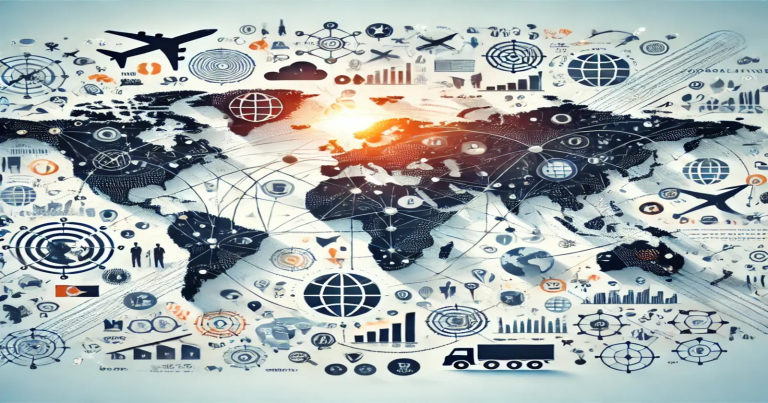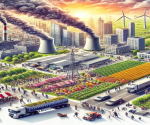Globalisation is the process whereby countries, companies, cultures, and people of the world are getting interconnected and interdependent. It has to do with the movement of goods, services, capital, information, and labor across international borders. Technology, communication, and transportation have accelerated globalization in the last few decades; almost everything under modern life from economics and politics to culture and the environment, has not been left unaffected.
Globalisation has brought forth many opportunities for economic growth, cultural exchange, and advancements in technology. These opportunities bring challenges to the income inequality scenario, the deterioration of the environment, and cultural homogenization. This article will try to understand what globalisation is, its types, the benefits it brings, the impact it has had, and what the future holds.
What is Globalisation?
Globalization is described as the interaction and integration of people, companies, and governments around the globe. International trade, foreign direct investment, and technological innovation are what drive globalization, creating a global marketplace where goods, services, and ideas flow freely. What was once considered an isolated incident has been molded into one of the shaping forces of the modern world-through linking economies and societies together more closely than ever before. Globalization affects everything, from what we buy to how we work and communicate.
- Economic Globalization: National economies are integrated through the exchanging of goods, investments, and capital flows.
- Cultural Globalisation : The crossing of cultural values, ideas, media, and lifestyles across the borders.
- Political Globalization: International cooperation through institutions such as the United Nations, World Trade Organization, and the International Monetary Fund.
- Technological Globalization: The rapid growth of technology and innovation, where cross-borders communication and business operations suddenly occur.
What Does Globalization’s Future Hold?
Globalisation is one of the most debated topics of time. The future of globalization will continue to change through the influence of advancing technologies, geopolitical dynamics, and ever-changing economic trends in the march of humanity.
Digital Globalisation
Greater integration in the future most probably will be through digital means, with e-commerce, fintech, and digital services forming a basis of trade across the world. Further development in blockchains and other technologies for artificial intelligence may even make it possible for economies across the world to become more interconnected through digital platforms.
Sustainability and Globalisation
In this context, rising fears about global warming may make future globalization more environmentally friendly. International cooperation over the environmental standards and green technology will be a key part of such transformation.
Regionalisation vs. Globalisation
The new COVID-19 pandemic and rising tensions over trade already have subjects creating regionalisation discourse. Some countries may turn to regionalised trade as a way to reduce dependence on world supply chains, which may provide a more balanced regional and global approach.
However, globalization is expected to continue and change into its new form as innovations in newer technologies make their way around the globe; greater economic cooperation among nations is also demanded.
Advantages of Globalisation
Advantages of globalisation span economic, cultural, and political realms. While globalisation has its critics, its benefits have been crucial in shaping the modern world.
Economic Benefits
- Increased economic growth: Globalization promotes international trade and investment, which eventually results in higher productivity and economic growth along with better standards of living.
- Job Opportunities: With companies expanding worldwide, they create more jobs in sectors such as manufacturing, services, and technology.
- Global market accessibility opens up new markets to a company, thereby increasing its revenue-generating opportunities while allowing consumers to have a wider range of goods and services.
Cultural and Social Benefits
- Cultural Exchange: Globalisation promotes cultural interaction. This leads to the sharing of ideas and languages. Traditions are also exchanged, leading to increased understanding and tolerance among societies.
- Innovation and Knowledge Sharing: Cross-border collaboration on science, technology, and education promotes the acceleration of innovation, research, and spreading knowledge.
Political and Environmental Gains
- Co-operation International friendly organizations have been formed in the age of globalization to promote peace, security and development of the world.
- Environmental Awareness: Climate change and other world issues are not limited to one nation. Globalization facilitates concerted action to address global problems, such as sustainability and environmental stewardship.
Types of Globalisations
On the other hand, types of globalizations can be classified along several aspects, including economic, political, cultural, and technological, all given a specific role in the development of the global landscape. Globalization is related to others in such a way that it creates an interrelated complex network of dependence that shapes the modern global economy and society.
Economic Globalisation
This helps integrate national economies into a global system through international trade, foreign investment, and capital flows. It is the driving force of the global marketplace with goods, services, and labor being traded across borders.
Political Globalisation
Political globalization is understood as the pressure of international organizations and treaties that direct international political relationships. International standards and rules guiding member countries are established by institutions such as the United Nations (UN), the World Health Organization (WHO), and the World Trade Organization (WTO).
Cultural Globalisation
Cultural globalization is a process by which the cultures influence each other, transfer their ideas and values, and ultimately become global. This refers to media, entertainment, fashion, and cuisine, among other things. When humans begin migrating into other countries, interacting, and getting into interactions across borders, there is naturally a blending of cultures that results in a shared global culture.
Technological Globalisation
Technology globalization is the spreading of technology and innovation at a global level. The frightening speed at which the internet is growing, with smartphones and other communication technologies by its side, has brought about the most interconnected world that ever existed.
Impact of Globalisation
Globalisation has far-reaching implications for economies, culture, and the environment in many contexts. It has brought so much good, but some significant threats are evident with its impacts. The effects of globalization on the global landscape continue to change the world: positive but also negative, and efforts must be directed toward control and adaptation continuously.
Economic Impact
- Increased Trade and Investment: Globalisation has enabled countries to specialise in the production of goods and services where they have a comparative advantage, increasing trade and investment.
- Income Inequality: While globalisation has helped lift millions out of poverty, it has also contributed to income inequality, particularly between highly skilled and low-skilled workers.
Cultural and Social Impact
- Cultural Homogenisation: Globalisation can lead to the spread of dominant cultures, resulting in the loss of local traditions and languages.
- Improved Education and Health: International cooperation has enhanced access to education and healthcare, improving living standards across the world.
Environmental Impact
- Environmental Degradation: The expansion of global trade has increased resource consumption and pollution, contributing to climate change and biodiversity loss.
- Sustainability Initiatives: Globalisation has also facilitated the spread of sustainable practices and technologies, as countries work together to tackle environmental issues.
Globalisation FAQs
What is Globalization?
Globalisation refers to increased interconnectedness and interdependence of economies, cultures, and governments across the world.
What does globalization have in its favor?
These include more enhanced economic growth, employment generation, cultural exchange, innovation, and international cooperation.
How many types of globalization are there?
The fundamental types include economic globalisation, political globalisation, cultural globalisation, and technological globalisation.
What is the impact of globalization?
Globalization has both advantages and disadvantages. Globalization increases globalization in trade and investment, cultural exchange, income inequality, and environmental degradation.
What is in the future for globalization?
In the future of globalization, greater emphasis on sustainability issues, and probably, regionalization responses to global challenges, digital integration will therefore be increased.


